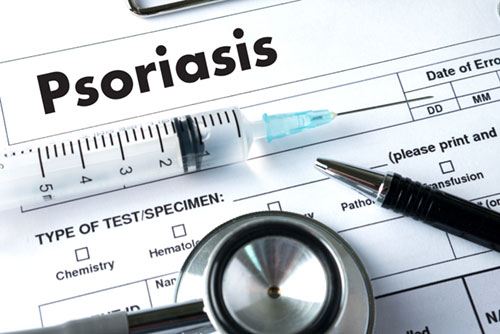
Psoriasis
Psoriasis is a chronic inflammatory condition triggered by an overactive immune system (dysregulation of the immune system).
Prevalence of Psoriasis
Psoriasis affects approximately 2-3% of the global population and ranges from 0.44% to 2.8% in India.
Appearance of Lesions
Psoriasis lesions appears as raised, reddish patches with thick, whitish scales or as pus-filled spots. They can also manifest as thick, raised patches on the scalp and irregular pits on the nails, often causing separation of the nail plate from the nail bed.
Types of Psoriasis
- Plaque Psoriasis
Regular reddish raised lesions with silvery scales on the surface. - Guttate Psoriasis
Usually seen in children; multiple small raised lesions with scales. - Inverse Psoriasis
Reddish plaques over the flexural areas like axilla and groins. - Pustular Psoriasis
Pus-filled lesions over existing plaques and previously uninvolved skin. - Erythrodermic Psoriasis
Erythema (redness) and scaling involve more than 90% of the body’s surface area. - Nail Psoriasis
Irregular pits on the nail plate; separation of the nail plate from the nail bed.
Pathophysiology
In psoriasis, there is a rapid turnover of skin cells (keratinocytes) in the epidermis, where cells normally take about one to one and a half months to mature and shed. This process accelerates to just 3-4 days, causing an accumulation of cells on the skin’s surface and resulting in thickened, raised lesions.
Affected Sites
Psoriasis can affect any part of the body, with common sites being the scalp, elbows, knees, and nails.
Beyond the Skin
Psoriasis is associated with psoriatic arthritis (joint inflammation) and metabolic syndrome (elevated blood sugar, cholesterol, and blood pressure).
Contagion and Genetics
Psoriasis is not contagious and does not spread through contact or airborne means. While it can run in families, it can also occur sporadically due to genetic mutations triggered by unknown factors.
Triggers and Aggravating Factors
Factors that can exacerbate psoriasis include smoking, alcohol consumption, winter weather, stress, certain medications, infections, and trauma.
Complications
Severe cases of psoriasis can lead to erythroderma, a condition where over 90% of the body surface is affected by redness and scaling, potentially causing fluid and electrolyte imbalances and involving other organs.
Diagnosis
Diagnosis is primarily clinical, though a skin biopsy may be performed for confirmation.
Treatment and Management
While psoriasis is not curable, it can be effectively managed. Treatment options include phototherapy, topical medications, oral medications, and injections. Treatment decisions are based on the patient’s age, overall health, and the type and severity of psoriasis.
Recent advances in psoriasis management focus on targeting specific overactive immune pathways rather than interacting with the overall immune system. This approach provides rapid control and minimizes side effects. These medications have been proven not only to control psoriasis but also to prevent psoriatic arthritis and other associated conditions.
Importance of Early Diagnosis
Early detection and treatment can reduce the risk of developing associated conditions like metabolic syndrome and depression.
Quality of Life
Psoriasis significantly impacts patients’ quality of life, causing physical and emotional distress. Patients often face social stigma due to misconceptions about the disease and may benefit from counselling.
Life Expectancy
Psoriasis itself does not typically affect life expectancy, but associated conditions and chronic stress can impact overall health.
Public Awareness
It’s crucial to educate the public that psoriasis is neither a disease of sin nor contagious. Encouraging support and understanding helps reduce the social stigma associated with the condition.
Support for Psoriasis Patients
Supporting individuals with psoriasis involves offering empathy and understanding, combating stigma, and promoting healthy lifestyle choices.

Dr. V. Madhumitha
Associate Consultant Dermatologist
Kauvery Hospital – Alwarpet

